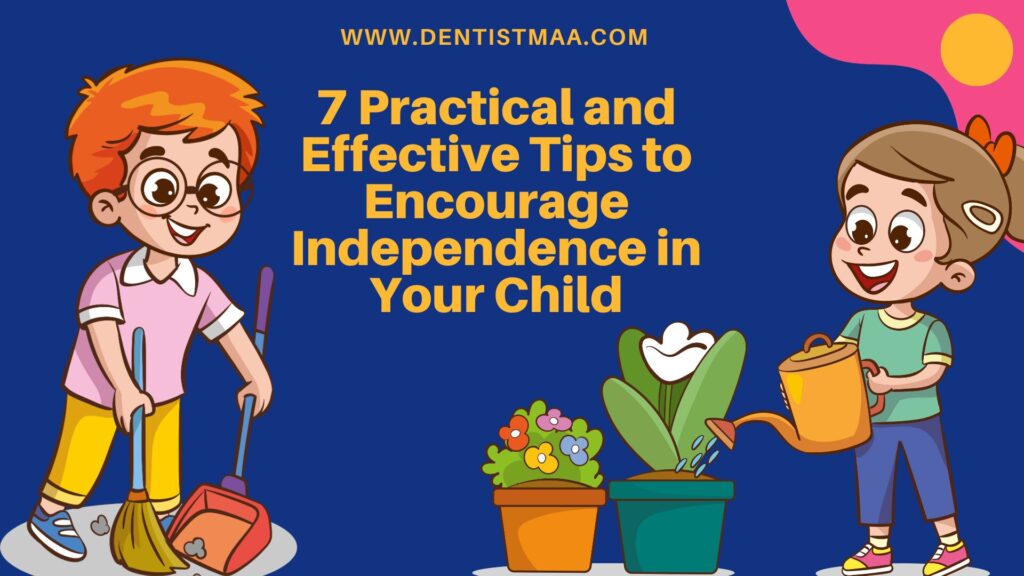Helping your child develop independence is one of the greatest gifts you can give them. Encouraging independence in your child nurtures confidence, decision-making skills, and resilience, preparing children for a successful future. As a parent, encouraging your child to be independent doesn’t mean stepping away completely; rather, it means providing guidance and opportunities for growth while allowing them the space to learn and explore independently.
Here are five practical and effective tips to encourage independence in your child:
1. Give Age-Appropriate Responsibilities
Children thrive when they feel capable and trusted. Assigning age-appropriate responsibilities helps them build self-confidence and teaches essential life skills. Start small and gradually increase their responsibilities as they grow.
- For Toddlers: Encourage them to put away toys, place dirty clothes in the laundry basket, or help set the table with unbreakable items.
- For Preschoolers: Let them dress themselves and water plants, or assist with simple cooking tasks like making a sandwich (fireless), fetching ingredients, and helping set the table. It might take you a little longer to finish the task, but eventually, it will be fruitful for the child.
- For Older Kids: Assign tasks like folding laundry, making their bed, packing their school bag, or helping with meal preparation.
Praise their efforts, even if the task isn’t done perfectly. The focus should be on their willingness to try and learn. This will help them to try again the next time and not give up until it becomes a habit.

2. Allow Them to Make Choices
Encouraging your child to make decisions fosters critical thinking and self-reliance. Start by offering them limited, age-appropriate choices and gradually expand their decision-making opportunities.
- For Young Children: Provide two options: “Would you like to wear the red shirt or the blue one?” or “Do you want an apple or a banana for snacks?”
- For Older Kids: Allow them to choose extracurricular activities, plan parts of the family’s weekend schedule, or decide how they would like to decorate their room.
Letting them experience the outcomes of their good and bad choices teaches responsibility and accountability. Offer guidance when necessary, but try not to intervene unless required.

3. Encourage Problem-Solving
Problem-solving is a critical skill for independence. When children face challenges, please resist the urge to step in and fix things for them immediately. Instead, guide them toward finding solutions on their own.
- Ask Open-Ended Questions: When your child encounters a problem, ask questions like, “What do you think you could do to solve this?” or “How can we fix this together?”
- Break Problems into Steps: Help them understand that complex challenges can often be tackled by breaking them into smaller, manageable parts.
- Celebrate Efforts: Whether their solution works or not, acknowledge their effort and creativity in solving the problem.
Over time, your child will gain the confidence to handle difficulties independently and develop resilience in the face of challenges. Another positive way to encourage problem-solving is by introducing puzzles to the child. This helps their brain be active, learn new things, and solve problems.
Click here to buy some good age-appropriate puzzles for your child.

4. Teach Self-Care Skills
Independence begins with learning to take care of oneself. By teaching your child basic self-care skills, you equip them with tools to feel capable and confident.
- For Younger Kids: Teach them to wash their hands, brush their teeth, and dress independently. Use fun tools like songs or timers to make these tasks enjoyable.
- For Older Kids: Involve them in meal preparation, teach them how to manage their belongings, and introduce simple household tasks like sweeping or organising their room.
While teaching self-care skills, be patient and encouraging. Remember, these skills take time to learn, but the benefits are lifelong.

5. Foster a Growth Mindset
A growth mindset is the belief that abilities and intelligence can be developed through effort, and this is a key to fostering independence. Help your child embrace challenges and see mistakes as opportunities to learn.
- Use Positive Language: Encourage phrases like, “You’re learning,” or “Mistakes help us grow,” to shift the focus from perfection to progress.
- Praise Effort, Not Just Results: Recognize the hard work they put into trying something new, even if the outcome isn’t perfect.
- Model Resilience: Share stories of your challenges and how you overcame them to show that setbacks are part of growth.
By fostering a growth mindset, you help your child develop the resilience and determination they need to tackle life’s challenges independently.
You can even buy age-appropriate books for your child to encourage a Growth Mindset.

6. Avoid over-helping
It is very common for parents to interfere and help their child every time they get a little stuck or ask for help. Whenever my daughter asks me for help in something I feel she can do on her own, I ask her to first try and if still she is unable to do it, call me. This helps her gain confidence in herself and also solves her problem. This makes her independent.
Never overindulge and avoid being a helicopter parent. Children of helicopter parents are not independent, have poor problem-solving skills, increased anxiety and reduced self-confidence. They also struggle with coping with difficult problems in adulthood.

7. Support Exploration and Risk-Taking
Supporting and encouraging your child to explore and take risks helps in building resilience, confidence, and problem-solving skills. It also helps encourage creativity and curiosity about the world and prepares children to navigate challenges in adulthood.
Maintain a balance when it comes to taking risks. The independence of the child should be supervised. My daughter loves gymnastics but I make sure she does her cartwheels and bridges only in a safe environment so that she or anyone around her doesn’t get hurt. Kids sometimes do things in a hurry or without notice, so you need to guide and be there with them when they are exploring and taking risks.

Bonus Tips to Encourage Independence in Your Child
- Set Clear Expectations: Communicate your expectations for behaviour and tasks. This gives your child a framework to follow while allowing them the freedom to figure out how to meet those expectations.
- Provide a Safe Environment: Ensure that your child’s environment is safe for exploration and learning. This reduces the need for constant supervision and encourages independent play.
- Encourage Peer Interaction: Playing and working with peers teaches children collaboration, teamwork and problem-solving skills.
- Be Patient: Developing independence is a gradual process. Celebrate small victories and stay patient during setbacks.
- Trust Them: Show your child that you believe in their abilities. Trust is a powerful motivator for kids to take initiative and try new things.
Final Thoughts
Encouraging independence in your child is about balancing guidance with freedom. By giving them responsibilities, allowing them to make choices, teaching problem-solving skills, and fostering a growth mindset, you empower your child to grow into a confident, capable individual. Remember, the journey to independence is a process, and every small step your child takes is a step toward their bright future.
As a parent, your role is to cheer them on, provide support when needed, and celebrate their progress. By nurturing independence, you’re not just preparing your child for the world—you’re giving them the tools to thrive in it.
What steps have you taken to encourage your child’s independence? Share your experiences in the comments below!
What Are the Benefits of Doing Chores for Kids? 10 Surprising Reasons Every Parent Should Know




